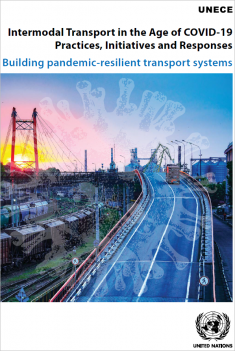
The Coronavirus (COVID-19) pandemic has placed our increasingly interconnected world in an unprecedented situation. This crisis has generated human distress and an economic downturn that is impacting global efforts to improve livelihoods and achieve the United Nations Sustainable Development Goals (SDGs).
As the early response to restraining the spread of the COVID-19 pandemic has shown, limited coordinated action undertaken in countries which included curtailing travel and closing borders, has negatively impacted our intensely interconnected world. By these actions, transport operations have been affected which has led to disruption of supply chains and trade flows. As a result, the delivery and availability of essential products such as food or medicines became a common challenge undermining countries’ capacity to respond to COVID-19 and begin to sustainably recover.
This publication provides a comprehensive overview of the efforts made by the UNECE Sustainable Transport Division through the various Working Parties it administers in the field of inland transport to support member States in their responses to this crisis.
Inter alia, the publication touches on issues relating to border crossing facilitation, road, rail and inter-modal transport, transport of dangerous goods and transport statistics. A comprehensive overview is provided of national, regional, international and sectoral transport policy responses and various UNECE transport legal instruments of significance in the context of cross-border emergency situations and pandemics are being presented and examined in more detail.

